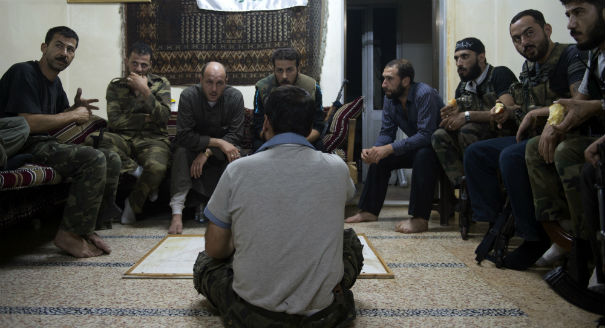Yesterday’s post described the background to the February 2014 split in the Free Syrian Army (FSA), a network of rebels fighting the Syrian government of Bashar al-Assad with Gulf and Western support.
That split has, superficially at least, taken on an institutional character. Most of the FSA’s General Staff supports its original leader, Lieutenant General Salim Idris. He is opposed by the defense minister in the Syrian opposition’s exile government, Assad Mustafa, and the FSA’s Supreme Military Council. They have backed Brigadier General Abdel-Ilah Bashir al-Nuaymi as a replacement for Idris.
In early March, a series of reconciliation meetings were held under the auspices of Ahmad al-Jarba, the head of the National Coalition for Syrian Revolutionary and Opposition Forces, a body of exiled politicians intended to function as the civilian leadership of the opposition. The meetings involved both Idris’s backers on the General Staff and Mustafa’s within the council. Jarba had previously aligned with the latter faction, but he now apparently sought to bridge the gap between them and find an acceptable compromise.
On March 5, Jarba and the National Coalition announced that they had reached an agreement with the General Staff officers whereby both Idris and Mustafa would simultaneously resign their posts and the council would be expanded to include new members. The agreement instantly fell apart. Instead of approving Mustafa’s resignation and allowing new members in, the council announced that the defense minister would stay in his post. “The agreement is ink on paper. It’s null and void,” said Qassem Saadeddine, a spokesperson for Mustafa and the Supreme Military Council.
This didn’t go down well with Idris’s friends in the General Staff. Someone yelled “there are a couple of people here whose heads needs cracking,” and a wild skirmish ensued. “Jarba received three punches even though he was not involved in the fistfight and was only trying to separate the two camps,” said the General Staff spokesperson Omar Abu Leila. Both sides, of course, blame each other.
Mustafa’s Version
In an interview on March 8, Mustafa tried to strike a conciliatory tone toward Idris, saying that the “former” General Staff commander had worked under difficult conditions. But he remained insistent that Idris was now out of the picture and that Abdel-Ilah Bashir’s election had been legitimate, making him the sole head of the General Staff and the FSA apparatus.
In Mustafa’s view, the matter was very simple. Idris had been elected by the council in December 2012, and in February 2014 the same council had removed him. If the first election was legitimate, then the second one also had to be respected. Now, the opposition should look forward and get on with the business of defeating Assad.
Idris’s Version
Idris, of course, did not agree with Mustafa’s account of what happened. Speaking to the opposition website Zaman al-Wasl in mid-March, he confirms that he still sees himself as the legitimate head of the General Staff, although he dodges the question of whether he still controls the flow of arms and ammunition to FSA-backed fighters in Syria.
He lists a number of reasons for why the council’s original decision to replace him with Abdel-Ilah Bashir on February 16 was constitutionally illegal and why it didn’t, in fact, reach the required two-thirds majority of members (as Mustafa claims). For Idris, the maneuver was “worse than a coup” and “what really happened is that there were agreements between certain individuals behind everyone’s back.”
He implicitly confirms that the reconciliation meeting between the rival military leaderships and the National Coalition in early March came to blows. According to Idris, he and his allies on the General Staff had agreed to the proposed deal and he had already written his letter of resignation. To his surprise, “Assad Mustafa, the [council], and the team of Ahmad al-Jarba” instead decided to scuttle the deal and followed this up by assaulting Idris’s supporters—using a slur normally reserved for government supporters, Idris calls it “shabiha behavior.”
A Saudi-Qatari Proxy Dispute?
The importance of the split is difficult to gauge, but one thing is certain: these institutions matter only as long as they can channel foreign support into Syria. Neither Idris nor Abdel-Ilah Bashir will last long if not backed up by at least one foreign government. The same goes for the opposition’s exile government and Mustafa.
The question is how important such state backing has been for the dispute from the beginning: Are these splintering FSA institutions linked to different foreign interests, and are the two camps simply fronting for foreign rivals?
The obvious place to look is the Persian Gulf, where the old Saudi-Qatari rivalry has just erupted into a full-blown cold war. The current FSA apparatus was originally built as a sort of merger between Saudi and Qatari efforts to arm the rebels. Indeed, Mustafa, Jarba, and the leader of a rising faction within the FSA, called the Syria Revolutionaries’ Front (members of which have been highly critical of Idris) are all known to receive backing from Saudi Arabia. Idris is not publicly known as a Qatari man in the same way, but he has made visits to Qatar lately and may be picking up support where he can find it.
On the other hand, given the importance of personal and institutional rivalries both within the opposition and inside the states backing it, it is difficult to imagine a Qatar-Saudi divide as the single cause of conflict. For one thing, other states are involved as well, and even without foreign interference the opposition has always suffered from organizational chaos and jockeying for positions. While foreign rivalries cannot be disregarded and need to be followed carefully, they should not be allowed to obscure the complexity of Syrian opposition politics.
Meanwhile, the political wing of the opposition moves toward a crucial vote of its own, as the National Coalition prepares to extend Saudi favorite Jarba’s presidential mandate in July 2014—something Qatari-backed politicians may decide to try to prevent. Expect more opposition infighting ahead.






